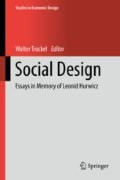Abstract
We characterize unanimous and strategy-proof random social choice functions in the classical committee formation model in terms of the properties of marginal decomposability and monotonicity. We show that if committees of a fixed size have to be selected, then an onto and strategy-proof random social choice function must be an appropriately defined random dictatorship.
Access this chapter
Tax calculation will be finalised at checkout
Purchases are for personal use only
Notes
- 1.
There are several ways in which this can be done. Here we follow the standard stochastic dominance approach developed in Gibbard (1977).
- 2.
A random social choice function satisfies unanimity if it picks a committee that is first-ranked by all agents, with probability one.
- 3.
We will consider one such problem in the next section.
- 4.
To see that it is possible to construct such a preference ordering, consider a lexicographic (and hence separable) preference over A where k is the lexicographic worst component (details may be found in Chatterji et al., 2012).
References
Aswal, N., Chatterji, S., & Sen, A. (2003). Dictatorial domains. Economic Theory, 22, 45–62.
Barberà, S., Massó, J., & Neme, A. (2005). Voting by committees under constraints. Journal of Economic Theory, 122, 185–205.
Barberà, S., Sonnenschein, H., & Zhou, L. (1991). Voting by committees. Econometrica, 59, 595–609.
Breton, M. L., & Sen, A. (1999). Separable preferences, strategyproofness, and decomposability. Econometrica, 67, 605–628.
Chatterji, S., Roy, S., & Sen, A. (2012). The structure of strategy-proof random social choice functions over product domains and lexicographically separable preferences. Journal of Mathematical Economics, 48, 353–366.
Chatterji, S., Sen, A., & Zeng, H. (2014). Random dictatorship domains. Games and Economic Behavior, 86, 212–236.
Chatterji, S., & Zeng, H. (2018). On random social choice functions with the tops-only property. Games and Economic Behavior, 109, 413–435.
Gibbard, A. (1977). Manipulation of schemes that mix voting with chance. Econometrica, 45, 665–681.
Hurwicz, L. (1972). On informationally decentralized systems. In C. B. McGuire & R. Radner (Eds.), Decision and Organization. North Holland: Amsterdam.
Peters, H., Roy, S., Sen, A., & Storcken, T. (2014). Probabilistic strategy-proof rules over single-peaked domains. Journal of Mathematical Economics, 52, 123–127
Picot, J., & Sen, A. (2012). An extreme point characterization of random strategy-proof social choice functions: The two alternatives case. Economics Letters, 115, 49–52.
Pycia, M., & Unver, U. (2015). Decomposing random mechanisms. Journal of Mathematical Economics, 61, 21–33.
Author information
Authors and Affiliations
Editor information
Editors and Affiliations
Rights and permissions
Copyright information
© 2019 Springer Nature Switzerland AG
About this chapter
Cite this chapter
Roy, S., Sadhukhan, S., Sen, A. (2019). Formation of Committees Through Random Voting Rules. In: Trockel, W. (eds) Social Design. Studies in Economic Design. Springer, Cham. https://doi.org/10.1007/978-3-319-93809-7_13
Download citation
DOI: https://doi.org/10.1007/978-3-319-93809-7_13
Published:
Publisher Name: Springer, Cham
Print ISBN: 978-3-319-93808-0
Online ISBN: 978-3-319-93809-7
eBook Packages: Economics and FinanceEconomics and Finance (R0)

